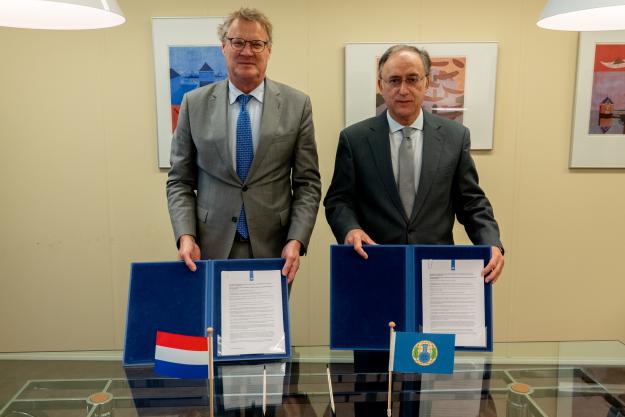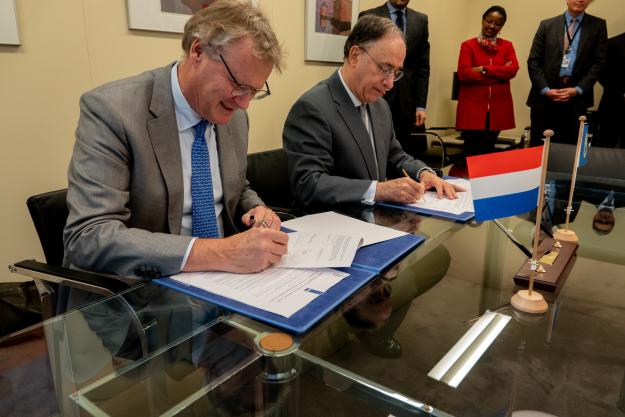
OPCW Director-General, H.E. Mr Fernando Arias, and the Permanent Representative of the Netherlands to the OPCW, H.E. Ambassador Paul van den IJssel
THE HAGUE, Netherlands — 12 November 2019 — The Government of the Kingdom of the Netherlands will make two contributions totalling €3.3M to support a number of major projects and activities of the Organisation for the Prohibition of Chemical Weapons (OPCW).
A contribution of €2.3M will be made to the OPCW Trust Fund to support the project to upgrade the current OPCW Laboratory and Equipment Store through the construction of a new Centre for Chemistry and Technology (“ChemTech Centre”). Another contribution of €1M will support the activities of the Trust Fund for Syria Missions at the OPCW. The Trust Fund for Syria Missions supports the Organisation’s missions and contingency operations related to the Syrian Arab Republic including the work of the Declaration Assessment Team (DAT), the Fact-Finding Mission (FFM), and the Investigation and Identification Team (IIT). The Dutch contribution aims to equip the OPCW with the means to maintain its professional and impartial standards in addressing the threat from chemical weapons use.
OPCW Director-General, H.E. Mr Fernando Arias, and the Permanent Representative of the Netherlands to the OPCW, H.E. Ambassador Paul van den IJssel, formalised the contribution today at a ceremony held at OPCW Headquarters in The Hague.
Ambassador van den IJssel highlighted the Netherlands’ longstanding support for the OPCW: “The Netherlands highly values the work of the OPCW. The commitments we formalize today are another illustration of our support to the organization and its crucial work.”
The Director-General expressed: “I thank the Government of the Netherlands for these major contributions, to the new OPCW ChemTech Centre and to the Trust Fund for Syria Missions. Both will further build the capabilities of our Member States to achieve a world free of chemical weapons. The construction of the Chem-Tech centre in the Netherlands highlights our deep-rooted collaboration towards countering the threat posed by chemical weapons”.
Director-General Arias appealed to all OPCW States Parties in a position to make voluntary contributions to do so. He further emphasised the important role the new ChemTech Centre will play in strengthening the OPCW’s ability to address chemical weapon threats, boost its investigative capability, and enhance capacity building activities. He highlighted that “all contributions, regardless of size, are greatly appreciated”.
So far, twenty-two States Parties and the European Union have contributed or pledged to contribute financially to the project, and a considerable amount has been raised to date.

OPCW Director-General, H.E. Mr Fernando Arias, and the Permanent Representative of the Netherlands to the OPCW, H.E. Ambassador Paul van den IJssel, formalised the contribution today at a ceremony held at OPCW Headquarters in The Hague.
Background
The project to build the ChemTech Centre is on-going and seeks to strengthen the OPCW’s capabilities to fully address new and emerging chemical weapons threats, as well as to support capacity building in OPCW Member States. The current OPCW Laboratory and Equipment Store are central to the effectiveness and integrity of the verification regime of the Chemical Weapons Convention, and they also contribute to the OPCW’s capacity-building and international cooperation activities. However, the current facility will soon no longer be fit-for-purpose due to its ageing infrastructure, space constraints, larger workloads, and new missions with new areas of work.
A new facility is required to meet the demands of OPCW States Parties for enhanced verification tools, improved detection capabilities and response measures, as well as increased capacity-building activities. The ChemTech Centre will also help the OPCW to keep pace with developments in science and technology and new chemical weapons threats. The OPCW Technical Secretariat is developing a detailed project plan for the construction of the ChemTech Centre, and a Trust Fund for voluntary contributions has been established to secure the required resources for the project.
To date, the following States Parties have contributed or pledged to contribute to the project: Bangladesh, Belgium, Canada, China, Estonia, France, Hungary, Ireland, Italy, Japan, Kazakhstan, the Netherlands, New Zealand, Pakistan, Poland, the Republic of Korea, Slovakia, Slovenia, Spain, Turkey, United Kingdom of Great Britain and Northern Ireland, and the United States of America. The European Union has also contributed.
As the implementing body for the Chemical Weapons Convention, the OPCW, with its 193 Member States, oversees the global endeavour to permanently eliminate chemical weapons. Since the Convention’s entry into force in 1997, it is the most successful disarmament treaty eliminating an entire class of weapons of mass destruction.
Over 97% of all chemical weapon stockpiles declared by possessor States have been destroyed under OPCW verification. For its extensive efforts in eliminating chemical weapons, the OPCW received the 2013 Nobel Peace Prize.
